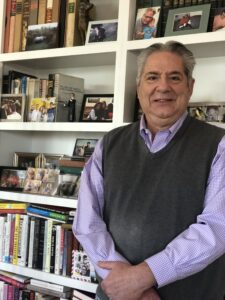Written by Kelsey Walock, Current History Major at Gustavus
The jazz opening of Gregory Kaster’s “Learning for Life @ Gustavus” podcast immediately directs the audience’s expectations to a lively hour of conversation on liberal arts. In the podcast’s trailer, Kaster describes a desire for a “series highlighting the diverse and creative work and thinking that makes Gustavus the wonderfully stimulating and transformative place of learning for life it is,” and speaks to alumni, faculty, staff, students, and more guests to illustrate exactly what it means to engage in a liberal arts education. With his background as a history professor here at Gustavus, the podcast has taken off. Having started the podcast in May 2020, the podcast currently sits in its seventh season and has glowing reviews among numerous podcasting platforms. While Professor Kaster often is the one asking questions, today we turn the tables and ask him about his experiences working with the podcast.
- How has podcasting been for you?
Doing this podcast has been one of the most rewarding experiences of my career at Gustavus. It is extremely interesting and energizing to speak with so many different people thoroughly engaged in learning for life as Gustavus students, faculty, administrators, trustees, and alums.
- What’s been a challenge with podcasting?
Finding the time!
- In the podcast’s trailer, you mention the influential moment of a live discussion you had with Warren Beck, a Gustavus alumnus. What aspects of that conversation resonated with you?
My conversation with alum and former trustee Warren Beck, primary benefactor with his wife Donna of Beck Hall, was a real treat. What I love about his story is that he was a history major at Gustavus who went on to enjoy a long and successful career in commercial real estate development. His answer in response to my question about how much a prospective hire’s major matters to him–“not much,” he replied–also made me happy since that is such an important message for Gustavus students to hear not just from their profs but from a businessperson.
- How much time do you spend researching and deciding on guests? Do topics come naturally or do you have a process you tend to follow?
On average I devote probably two-three hours a weekday per guest to thinking about who to contact, emailing them usually more than once to invite them and settle on a date, researching them (reading resumes and faculty CVs, profile pages, news items, and other content available online), and, writing my introduction of them and the episode title and description. I’m especially proud of the introductions and titles and enjoy working on both. I have no methodical process for determining guests and topics. I try to include a range of faculty, students, and alums in each season. Some people already know reasonably well, while others are suggested to me by colleagues, staff, and co-producer JJ Akin of Marketing. I have an ever-growing list of people I hope to podcast with–enough for many months!
- You’re in your seventh season, how do you determine length, topics, or other attributes that make up a season?
See above. I want to have a variety of experiences, backgrounds, identities, academic majors, disciplines, and programs, and post-graduation work and careers represented in each season. Topics are really a function of the person joining me. Initially JJ Akin and I thought in terms of quite short recordings. Soon, though, I realized that there was enough to talk about with each guest to necessitate typically 50-60 minutes.
- Podcasting is one of the forms of media that is easily adaptable to the pandemic. Having started the podcast during the pandemic while we were not on campus, what do you see for the future? Post pandemic, whenever we get there, do you intend on changing anything about your process?
I want to continue the podcast, pandemic or not. I hope to improve as an interviewer and would be thrilled if the podcast helps to (in the words of the current capital campaign) “show the world” about Gustavus, perhaps helping to attract students in the process.
- Often history finds its way into the conversation. How has being a history professor helped your journey in podcasting?
Great question, which I’ve thought about before. I think my training and work as a history prof has helped me be aware of the importance of beginnings or origins and historical context, the connections between past and present, the role of contingency, and the interplay of agency and constraints in every person’s life.
- Your podcast centers around the thought of a liberal arts education, what drove you to that choice?
Being a professor at an excellent national liberal arts college and wanting to make a case for the liberal arts at a moment, certainly not unique in the history of US higher education, when a liberal arts education is devalued by some, the humanities are in some quarters routinely dismissed as useless and thus expendable, the arts are endangered by the pandemic, and science, democracy, and even reality itself are under assault.
9. If audiences could walk away learning only one message from your podcast or this interview, what would you hope it to be?
That learning for life with the help of a fine liberal arts education is incredibly rewarding, if not always easy or comforting, humanizing (at least potentially), and essential to the never-ending work of creating and sustaining a just, healthy, and compassionate world.
- Any other comments or thoughts you want to share?
Tune in, and thank you for listening.
You can find the podcast at various listening sites, such as Apple Podcasts, Spotify, and more. Transcripts of each episode are also available at https://news.blog.gustavus.edu/tag/lfltranscripts/
